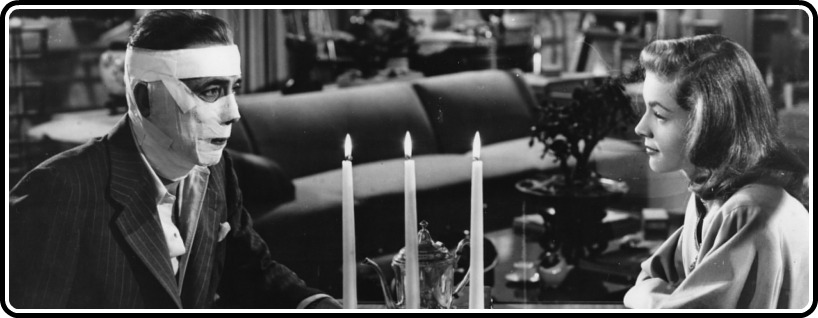The first person, subjective camera has been attempted as long as cinema has existed. With entire features like The Lady In The Lake using it to tell a gritty, down to earth tale of deceit and murder, and others like the Gaspar Noe film Enter The Void using it in a far more surreal, dream like way, very few films have been able to use it as anything more than a highly stylized gimmick. However, when it comes to a film like Dark Passage, it not only becomes vital, but adds an extra level of style to an already brooding bit of noir.
It also helps to have a director like Delmer Daves behind the camera. Best known for films like 3:10 To Yuma, Jubal and The Red House, Daves helms this picture that tells the tale of Vincent Parry who, after escaping from prison, has plastic surgery to disguise himself, allowing him to clear his name of a murder he didn’t commit.
With the film’s first third being shot almost entirely from Parry’s point of view, it isn’t until roughly the 37 minute mark that we become privy to just what Parry looks like, and even then, it’s not without a bandaged face following a surgery. The bandages are taken off nearly an hour into the picture to reveal Bogart’s face as that of our lead, and while this all sounds like a gimmick, Daves’ ability to add style to the gimmick elevates the material.
As unsung a filmmaker as there ever was, Daves is the star of the picture. The first act is kinetic and full of life, thrusting the viewer directly into this world and into the life of our stubborn lead, Vincent. The genre he’s messing in with this film, film noir, is an inherently grimy and ominous one, and this film is no different. The black and white photography from Sidney Hickox (who would also work with Bogart on The Big Sleep as well as films like White Heat) is fantastic, particularly the night sequences which are contrast heavy, and the sequences inside of the various hideouts our lead finds himself in, which have an extra level of tension thanks to Franz Waxman’s solid score.
However, while the black and white photography and crime-centric narrative may hint at the genre Daves is dealing in here, it’s the themes the film touches on that shows the film’s noir hand. Incredibly existential, Daves’ film weaves a story about a man inherently battling things he has no control over. Be it stated plainly by various characters throughout the film, or hinted at in random moments like a car pulling out in front of a cop on the hunt of Vincent, the film (and noir in general) is almost explicitly about man’s existential journey as much as it is a morality play.
Even more so, the film’s narrative opens up when the camera does. Prior to the reveal of Vincent’s bandaged face, the film feels decidedly intimate, almost like watching a photographed stage play. You flow from moment to moment as Vincent does, running into various men and women only to stay right in the eyes of Bogart’s Vincent. But following a deeply creepy dream sequence, the film (and Daves’ camera) expand into a stylish (if a tad standard) bit of noir. Throughout his canon, Daves has proven to be a fantastic filmmaker that doesn’t have the right amount of support behind him as he should. Lacking a lot of the auteur touches that made many directors of his time period the icons they became, his ability to jump from noir to Western to romance film (Bird Of Paradise), Daves should be rightly remembered as a truly great director.
It also helps to have the team of Humphrey Bogart and Lauren Bacall aboard as part of your cast. The third film the couple made together (of four), it may not be as potent a film as The Big Sleep, their performances are just as good. Bogart is his usual, brutish leading man who looks as good in a suit as in a tank top throwing a punch, and his chemistry with Bacall’s Irene feels ripped right out of a Noir 101 class. Agnes Moorehead is as good as ever here, and Clifton Young is a perfect foil to Bogart’s Vincent. It’s a superb cast that really elevate a relative potboiler narrative.
Set in San Francisco and based on David Goodis’ novel entitled The Dark Road, Dark Passage is a brazenly stylistic noir that has a final act featuring death, romance and even a bit of pitch black social commentary. Seemingly inspired by the men-wrongly-accused pictures of Hitchcock and the film noirs of its time, Passage may have a second act that begins to lull, but as far as intriguing experiments in filmmaking go, this is as intriguing an experiment as the ‘40s can offer, especially from a studio like WB, best known for its work within the world of gangsters. Released during a time when every member of the Hollywood population was being called to the mat about their possible connection to Communism and everything related to it, this paranoia-filled look at a man who needs to change everything about him to clear false negativity connected to his name cuts close, and the experimental aesthetic makes it a truly underrated classic.




![Bergman Island (The Criterion Collection) [Blu-ray]](https://criterioncast.com/wp-content/uploads/2022/11/bergman-island-the-criterion-collection-blu-ray-400x496.jpg)
![This Is Not a Burial, It’s a Resurrection (The Criterion Collection) [Blu-ray]](https://criterioncast.com/wp-content/uploads/2022/11/this-is-not-a-burial-its-a-resurrection-the-criterion-collection-blu-ray-400x496.jpg)
![Lars von Trier's Europe Trilogy (The Criterion Collection) [The Element of Crime/Epidemic/Europa] [Blu-ray]](https://criterioncast.com/wp-content/uploads/2022/11/lars-von-triers-europe-trilogy-the-criterion-collection-the-element-of-400x496.jpg)
![Imitation of Life (The Criterion Collection) [Blu-ray]](https://criterioncast.com/wp-content/uploads/2022/11/imitation-of-life-the-criterion-collection-blu-ray-400x496.jpg)
![The Adventures of Baron Munchausen (The Criterion Collection) [4K UHD]](https://criterioncast.com/wp-content/uploads/2022/11/the-adventures-of-baron-munchausen-the-criterion-collection-4k-uhd-400x496.jpg)
![Cooley High [Criterion Collection] [Blu-ray] [1975]](https://criterioncast.com/wp-content/uploads/2022/11/cooley-high-criterion-collection-blu-ray-1975-400x496.jpg)